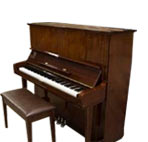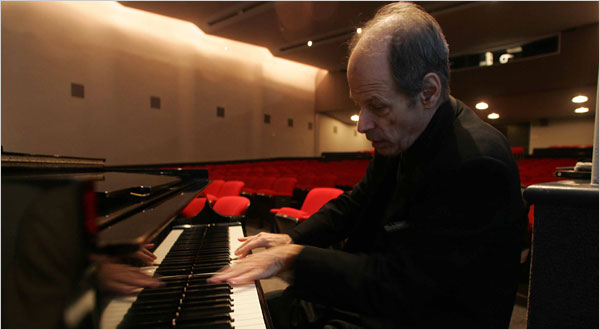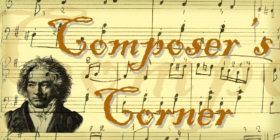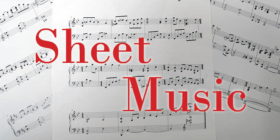
Mr. Oderman in 1967 with the actress Lillian Gish, who encouraged his piano playing.
THE NEW YORK TIMES: Stuart Oderman, who has performed alongside the likes of Rudolph Valentino and Charlie Chaplin, leaned against a piano at the Museum of Modern Art and reminisced about some numbers from the 1950s
“The numbers were all written on betting slips, and I’d put the slips on the bottom of a bag, and then I’d put some doughnuts on top of the slips and some powdered sugar on top of the doughnuts and go make my drop, because who is going to stop a 13-year-old kid carrying a bag of doughnuts?” he said. “The mob guy I worked for, every time he saw how well I hid those numbers, he would say, ‘That kid, he’s got some real talent.’ ”
By the time Mr. Oderman was running numbers along Belmont Avenue in Newark, where he grew up, he had already developed another talent — at the keyboard.
“The mob guy I worked for knew I had been taking piano lessons since I was a kid, and so he would often let me play at a neighborhood bar he owned,” said Mr. Oderman, 69. “I’d play Sinatra song after Sinatra song, and if I played ‘I’m in the Mood for Love,’ that was a signal that meant get out quick, something’s not kosher.”’
Mr. Oderman’s descent into the underworld was halted at 14 thanks to a chance encounter with — of all people — the actress Lillian Gish at a showing of one of her most famous movies, “Broken Blossoms,” and for the last half century, he has been an accompanist and composer for silent films. Now one of the few remaining masters of that almost-lost art, he has written four books related to the silent era, which he cannot stop talking about.
“I fell in love with silent films at a very young age,” he said. “In these films, there is a directness and an honesty between actor and audience, all done through gestures and raw emotion, that became a lost art when the talkies began arriving in the late 1920s.”
Mr. Oderman arrived at the Roy and Niuta Titus Theater 1 at the Modern on Feb. 5 to time the score of a coming film. The bright red seats were empty, but he still wore a dark blue dinner jacket. Before long, he was describing that scene from 1954, the one that turned his life around.
“I cut school one day so that I could come to this very theater to watch ‘Broken Blossoms,’ ” he said. “I was only 14 years old. I sit in my seat, look to my left and Ms. Gish is sitting right next to me.
“ ‘You belong in school,’ she said to me.
“We started talking, and I told her that I loved silent movies and that I would love to have a job like Arthur Kleiner, who was the silent film pianist here at that time. Ms. Gish takes me right over to Mr. Kleiner, who took me under his wing and gave me piano lessons for the next two years.”
Mr. Oderman, who lives in East Orange, N.J., with his wife, Janet Sovey, enrolled at Newark State College (now Kean University), where he majored in English and wrote about music and art for the college newspaper. In his spare time, he played piano “anywhere to make a buck,” he said — “birthday parties, bar mitzvahs, strip clubs, you name it.”
During what he called “the Dirty Dancing era,” he performed alongside comedians like Henny Youngman and Jack Carter in what he described as “B-circuit hotels” in the Catskills.
For far less money, or even no money, he pursued his calling, providing musical accompaniment for silent films at libraries and museums, and eventually writing scores for some of the pictures. In 1968, Mr. Oderman received a call from the Museum of Modern Art. “They asked me to come in and be the silent theater pianist,” he said. “It’s the one job I had always wanted.”
The actress June Havoc, 96, who appeared in silent pictures as a child, sang Mr. Oderman’s praises.
“I have always admired Stuart’s use of his considerable talents as a musician and a writer to serve the art he loves — the art of silent film,” Ms. Havoc, who lives in Stamford, Conn., said through a personal assistant.
Mr. Oderman, who was honored by the museum last month for his 50 years of work with silent pictures, will next perform at the Brooklyn Public Library on March 1, accompanying the 1923 film “The Extra Girl,” starring Mabel Normand.
Ken Gordon, a film curator who heads the silent film program at the library, called Mr. Oderman “a torchbearer from another era.”
“Most of the people who starred in these silent movies are gone,” Mr. Gordon said. “But through his fine piano playing, Stuart Oderman has kept their work alive.”










